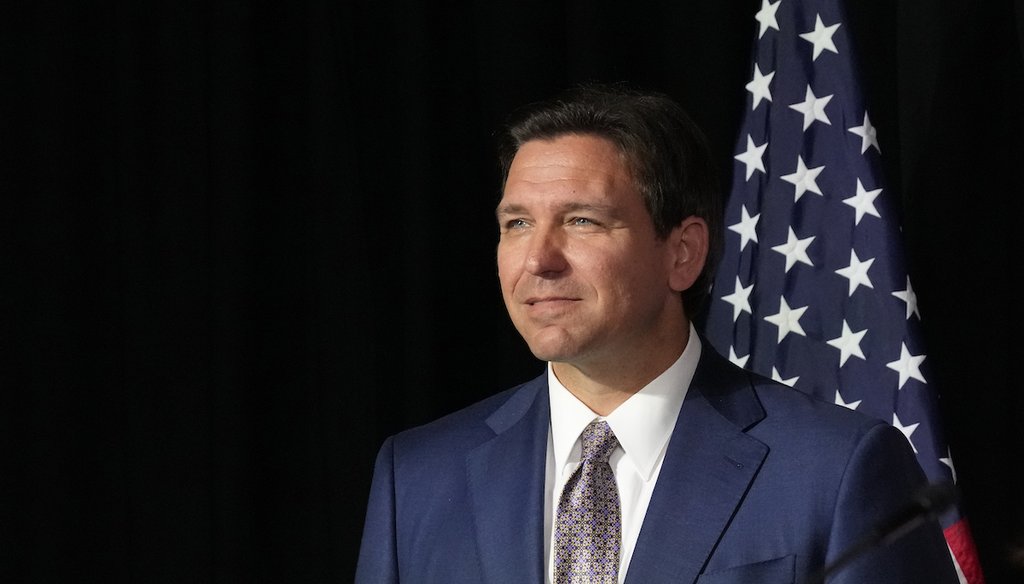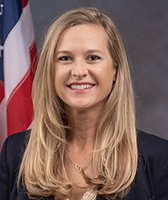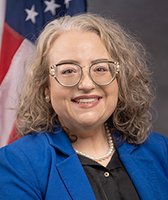Stand up for the facts!
Our only agenda is to publish the truth so you can be an informed participant in democracy.
We need your help.
I would like to contribute

Florida Gov. Ron DeSantis looks on after announcing a proposal for Digital Bill of Rights, Feb. 15, 2023, in West Palm Beach, Fla. (AP)
Florida Gov. Ron DeSantis' new book is as much a memoir as it is a map of his political ideology. An anecdote about playing Little League baseball is tied to his support of Taiwan. He spends more ink detailing his public battle with Walt Disney World than his wedding at the Magic Kingdom.
DeSantis, regarded as a potential Republican challenger to former President Donald Trump, promoted his book as a "blueprint for America's revival." Over 256 pages, "The Courage to Be Free" positions DeSantis as a battle-tested leader who defeated the "woke elites" on political issues around COVID-19, election management and U.S. history.
His book often glosses over the snags he faced along the way. It also shies away from outright attacking Trump, though DeSantis refers to some disagreements with Trump's initial approach to COVID-19 and downplays the significance of Trump's primary endorsement in the 2018 governor's race.
We fact-checked seven statements in his book that are wrong, misleading or lacked context.
"Some were thankful for keeping Florida open during the coronavirus pandemic. Others were thankful for keeping their kids in school."
In the book's early pages, DeSantis revels in his record of snubbing public health recommendations to curb the spread of COVID-19. But he largely omits the closures of schools and businesses that happened under his watch.
"Some even questioned my decision to keep our beaches open, as if there was a real risk of catching COVID-19 on a hot, sunny beach."
The Gang of Eight immigration bill "represented the largest amnesty in American history."
Defining "amnesty" is tricky. Some view it as blanket permission for undocumented immigrants to remain in the United States. Others view amnesty as any measure that is favorable to any undocumented immigrant, even if it includes a list of tough measures they have to meet.
The 2013 "Gang of Eight" immigration bill fell into the latter category. The bill proposed by eight senators — four Republicans, four Democrats — included a path to legal status and eventually citizenship and more money for border security. The bill passed the Senate but stalled in the House because Republicans wanted Congress to focus first on border security.
The bill mandated fines, background checks and waiting periods, and it was tougher than its 1986 predecessor signed by President Ronald Reagan. The bill did not offer blanket legal residency to unauthorized immigrants, but it did offer a measure of clemency to those immigrants who would not be required to return to their home countries.
His actions on election integrity included "eliminating drop boxes."
DeSantis did not eliminate the use of drop boxes in elections.
In 2022, the Republican-led Florida Legislature passed a law that renamed drop boxes "secure ballot intake stations." They look just like the previous version of drop boxes. Florida law generally requires that any such stations be placed at election offices or early voting sites, and must be monitored by staff members who empty them daily.
Drop boxes were used for decades nationwide without controversy until Trump in 2020 led the way in casting doubt about their security.
DeSantis' spokesperson Bryan Griffin told PolitiFact that "intake stations are monitored 24/7. Drop boxes are not." But Florida's 2021 law already had rules requiring election workers to monitor boxes in person back when the state used the "box" word. And before Florida passed these more recent laws regarding security measures for the boxes, many counties already used security procedures.
His administration prohibited "Zuckerbucks (i.e. private money funneled to election offices, typically for partisan purposes.)" Meta CEO Mark Zuckerberg "used his $400 million to manage the election itself."
This is misleading. In 2020, election offices faced an expensive and unprecedented challenge of holding elections during a pandemic. Federal money did not cover all the extra expenses, including an increase in voting by mail.
Meta CEO Mark Zuckerberg and his wife, Priscilla Chan, gave about $400 million in an effort to close the gap. Zuckerberg and Chan did not manage the election; they awarded the money to nonprofits, which then awarded grants to election offices.
One pot of money went to states led by Republican and Democratic election officials. Another pot of money went to 2,500 local elections offices. In Brevard County, Florida, where voters overwhelmingly voted for Trump in 2020, election officials spent about $840,000 on machines and technology used at the polls and for mail ballots.
After the 2020 election, Florida joined about half of U.S. states in banning private money for elections.
"Far from being a pro-slavery event, the American Revolution put slavery on the defensive. Until 1776, slavery had been a constant throughout human history, dating back to antiquity."
DeSantis' book blamed the protests that erupted after the 2020 killing of George Floyd by a Minneapolis police officer for critical race theory, a broad set of ideas about systemic bias and privilege, gaining steam in education and across the U.S.
Turning his aim to The New York Times' 1619 Project, DeSantis disagreed with the premise that slavery had "a central role" in the American Revolution. He's made this claim before; previous iterations even suggested that "no one had questioned" slavery before Americans. Experts have said DeSantis' comment that the American Revolution jump-started abolition is incorrect.
The United States was founded in 1776 and did not abolish slavery until 1865. Meanwhile, France, for instance, began the movement to end slavery on its mainland in 1315, though the country was later active in the slave trade and continued the practice in its colonies. France abolished slavery in its colonies in 1794 and gave enslaved people citizenship in 1848.
British abolitionism also predates the revolution, Phillip Deloria, a Harvard professor and historian, told PolitiFact.
Decades before the American Revolution, Samuel Sewell, an English colonist who resided in Massachusetts, criticized the enslavement of African people and in 1700 published an essay titled "The Selling of Joseph," that argued the practice was an "atrocious" crime.
Says his debate performance turned the 2018 Republican gubernatorial primary toward his favor.
When DeSantis faced a contentious Republican primary challenge from then-Agriculture Commissioner Adam Putnam, Trump said he tipped the scales in DeSantis' favor. DeSantis disagreed.
He credits a December 2017 tweet from Trump as boosting his name recognition across Florida, but qualified the former president's influence by writing that the state's voters are not "sheep who simply follow an endorsement from a politician they like without any individual analysis."
DeSantis added that the momentum Trump's tweet gave his campaign was short-lived. "In the middle of June, a little more than two months before the primary, an NBC News poll had me losing to Putnam by 17 percent," he wrote. Luckily, DeSantis said, everything changed after a June 28, 2018, debate with Putnam, and "the race was over."
DeSantis neglected to mention that Trump tweeted out a second "full endorsement" ahead of that debate on June 22, 2018, calling DeSantis, "strong on Borders, tough on Crime & big on Cutting Taxes - Loves our Military & our Vets.
"He will be a Great Governor & has my full Endorsement!" Trump wrote.
Spot a statement by DeSantis or another presidential contender we should fact-check? Email [email protected].
RELATED: All of our fact-checks of Ron DeSantis on the Truth-O-Meter
RELATED: Tracking 2018 campaign promises on our DeSant-O-Meter
CLARIFICATION, March 1, 9 p.m.: Shortly after publicaton, we updated the story to clarify that money from Meta CEO Mark Zuckerberg and wife Priscilla Chan to help with elections came from the couple themselves.
Our Sources
Email interview with Bryan Griffin, DeSantis' press secretary, March 1, 2023
Email interview with Phillip Deloria, a historian and professor at Harvard, March 1, 2023
CNN, 7 governors still haven’t issued stay-at-home orders. Here’s why, April 13, 2020
The Florida governor’s office, Executive Order 20-91, accessed March 1, 2023
The Florida governor’s office, Executive Order 20-68, accessed March 1, 2023
Florida Department of Education, Florida extends distance learning through remainder of academic year, accessed March 1, 2023
Youtube, March 20, 2020
Gov. Ron DeSantis press release, Governor Ron DeSantis Signs Bill to Strengthen Florida’s Election Integrity, April 25, 2022
Volusia County Supervisor of Elections, Tweet, Aug. 16, 2022
Levy County Supervisor of Elections, Tweet, Oct. 27, 2022
Former Leon County Supervisor of Elections Ion Sancho, Tweet, Aug. 13, 2022
National Conference of State Legislatures, Prohibiting Private Funding of Elections, Jan. 24, 2023
PolitiFact, Marco Rubio said someone could blow up a ballot drop box, ignoring safe track record, Oct. 19, 2022
PolitiFact, In Georgia race, election denier distorts Brad Raffensperger’s use of a Zuckerberg grant, May 19, 2022
PolitiFact, 'Zuckerbucks' for 2022 elections? Republicans say thumbs down, March 15, 2022
Ron DeSantis, tweet, Sept. 20, 2022
Massachusetts Historical Society, Samuel Sewel, accessed March 1, 2023
Massachusetts Historical Society, The Selling of Joseph, accessed March 1, 2023
Newsweek, Historians Trash DeSantis' Understanding of U.S. History—'Beyond Ignorance,' Sept. 24, 2022





















































